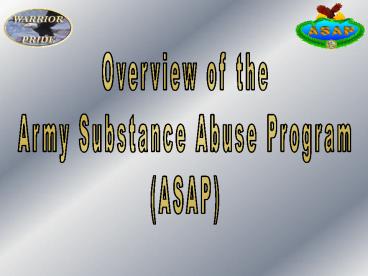Army Center for Substance Abuse Programs - PowerPoint PPT Presentation
1 / 15
Title:
Army Center for Substance Abuse Programs
Description:
Refer to Alcohol Drug Abuse Prevention Training (ADAPT) 12 Hours of education intervention Referral to another agency Chaplain, marriage counselor, ... – PowerPoint PPT presentation
Number of Views:498
Avg rating:5.0/5.0
Title: Army Center for Substance Abuse Programs
1
Overview of the Army Substance Abuse
Program (ASAP)
2
OBJECTIVES
- Identify the two ASAPs
- Identify the conditions that require a Soldier
to be processed for administrative separation for
substance abuse - Identify testing and training requirements
outlined in AR 600-85
3
Program Authority
Army Regulation 600-85 15 Oct 2001 Army
Substance Abuse Program (ASAP) Formally
known as Alcohol and Drug Abuse Prevention
Control Program (ADAPCP)
Public Law 92-129 28 Sep 1971 Established drug
prevention and control programs in the Armed
Forces.
DoD Directive 1010.1 9 Dec 1994 - Drug Abuse
Testing Program. DoD Instruction 1010.16 9 Dec
1994 - Technical Procedures for the Military
Personnel Drug Abuse Testing Program.
4
ASAP Principle
Abuse of alcohol or use of illicit drugs by
both military and civilian personnel is
inconsistent with Army values, standards of
performance, discipline, and the readiness
necessary to accomplish the Armys mission.
5
Guiding Principles
- AR 600-85 1-31 states
- The Army Substance Abuse Program is a command
program that emphasizes readiness and personal
responsibility. - The command role in prevention, biochemical
testing, early identification, rehabilitation and
administrative or judicial actions is essential. - Commanders will ensure that all officials and
supervisors support the ASAP.
6
Army Substance Abuse ProgramOrganization
Garrison Commander
Medical Treatment Facility Commander
Director Human Resources
Alcohol Drug Control Officer (ADCO)
Clinical Director (CD)
Medical Review Officer (MRO)
Drug and Alcohol Counselors
Installation Biochemical Test Coordinator (IBTC)
Prevention Coordinator (PC)
Employee Assistance Program Coordinator (EAPC)
7
Army Substance Abuse ProgramStaff
- Alcohol and Drug Control Officer (ADCO) The
Garrison ASAP manager and the Commanders POC for
all substance abuse issues. - Prevention Coordinator (PC) Conducts education
and prevention efforts on the installation
Units main resource for education and training
materials. - Installation Biochemical Test Coordinator (IBTC)
The installation SME on drug testing issues. - Employee Assistance Program Coordinator (EAPC)
POC for troubled civilian employees to receive
counseling and referral services. - Clinical Director (CD) Clinical ASAP Manager
8
ASAP Services
- Garrison
- Provide prevention education Unit training,
school programs, special events, etc. - Provide information - Campaigns, posters,
pamphlets, etc. - Run the drug testing program
- Train and certify UPLs
- Civilian Employee Assistance Program
- Clinical
- Screen personnel for possible enrollment in
treatment - Provide treatment services
- Medical Review Officer (MRO) services from MTF
(not ASAP) The MRO determines if a positive
specimen was positive due to legitimate medical
use or illicit use
9
Commanders Responsibilities
- Implement a unit biochemical-testing program.
- Implement ASAP prevention and education
initiatives 4 hours/year. - Ensure all newly assigned Soldiers are briefed on
ASAP policies and services. - Maintain ASAP elements while deployed.
- Report all offenses involving illegal possession,
use, sale, or trafficking in drugs or drug
paraphernalia to the PMO. This includes all
positive drug test.
10
Drug Use Policy
- Soldiers identified as drug abusers using
illegal drugs, using someone elses prescribed
drugs or abusing their own prescription.
Regardless of rank or time in service, must be - Referred for screening at the Clinical ASAP
- Considered for disciplinary action under UCMJ
- Courts-Martial
- Article 15
- Processed for administrative separation
11
Alcohol
- Testing - Commanders may test the unit or parts
of the unit randomly for alcohol - Blood Alcohol Content (BAC), based on breath
test, of .05 is considered impaired on-duty - Test must be confirmed by MP breathalyzer or a
Legal Blood Alcohol Test at the MTF. - Commanders must deglamorize alcohol use alcohol
consumption should NOT be the main focus of any
unit event. - Enforce underage drinking violations charge
both the underage drinker and the Soldier that
provided the alcohol.
12
Alcohol Incident Policy
- Alcohol related incidents
- Referred for screening at Clinical ASAP
- Considered for disciplinary action under UCMJ
- An administrative separation action will be
processed for Soldiers involved in two serious
incidents of alcohol related misconduct in a year
- Alcohol Related Incidents (Misconduct) include
but are not limited too - Impaired on duty
- DWI/DUIs
- Underage drinking
- Providing alcohol to someone under 21
- Negative incident involving alcohol fighting,
child or spouse abuse etc.
13
Screening By Clinical ASAP
- Possible outcomes
- No ASAP services required at this time The
Soldier does not have an alcohol or drug problem
and does not require further education. - Refer to Alcohol Drug Abuse Prevention Training
(ADAPT) 12 Hours of education intervention - Referral to another agency Chaplain, marriage
counselor, etc. - Enrollment in to ASAP Rehabilitation The
counselor will contact the commander to discuss
treatment options.
14
Summary
15
Questions?
- ASAP Telephone Number
- ASAP Address































